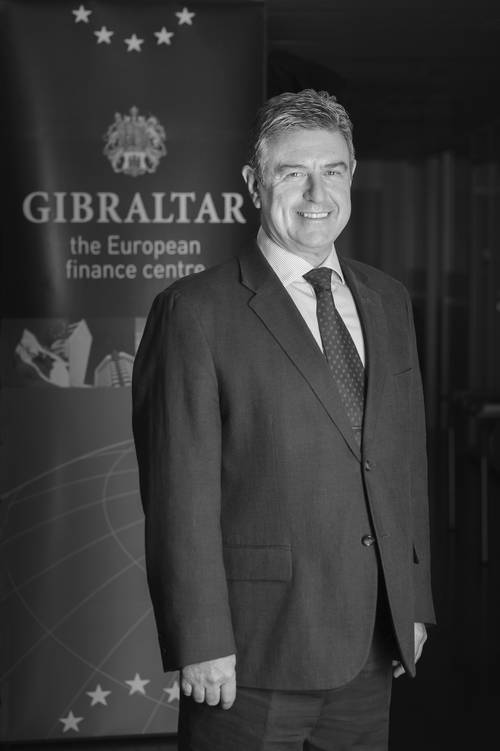“There is huge and growing interest in Gibraltar as our regulatory framework develops and this is increasing further as we make the final preparations on our regulations for token sales.”
(Paul Astengo, Senior Executive, Government of Gibraltar)

Paul Astengo is not often to be found in his office. His job, he says as he ushers me into the conference room at the Gibraltar Finance Centre where he is a senior executive, is to make sure that the rest of the world knows about and recognises that Gibraltar is a world-leading hub for financial services, in particular for the fintech industry and those firms working with distributed ledger technology, the blockchain and cryptocurrencies.
If the increasing take-up of local firms’ professional services as well as the number of applications for licenses at the Gibraltar Financial Services Commission are anything to go by, Paul is hammering home the message across the world. Over the years Gibraltar has developed strong working relationships with the UK and has also been building equally strong links with the Far East through the Gibraltar Government’s office in Hong Kong.
“I tend to travel rather a lot,” Paul explains, “and, alongside other members of the DLT Working Group, which includes some of Gibraltar’s top professionals and experts in the field, I help to represent Gibraltar’s interests in conferences and forums across the world.” Lithuania, Tel Aviv, London, New York are just a few of the many destinations across the world visited by Paul, Gibraltar’s Minister for Commerce, Albert Isola, and practitioners from Gibraltar’s private sector. Gibraltar is, indeed, blazing a trail on regulating firms that use DLT in business that stores or transmits value belonging to others, and in so doing, is successfully attracting reputable businesses who are serious in wanting to develop an international customer base for their services and products.
Gibraltar’s regulatory system is known to be robust, yet flexible. The process of developing financial services regulations is relatively straight-forward: Gibraltar’s Government sets policy, often in consultation with the private sector, and in particular following representations made by the Finance Centre Council. Paul’s team works on developing the relevant legislation to give effect to that policy, normally working in tandem with a team of local experts (and on occasion, experts in UK) and the Gibraltar Financial Services Commission (GFSC). What emerge are the regulations that can then be applied by Gibraltar’s regulator, the GFSC. In the case of regulations associated with DLT, the blockchain and the cryptospace, the local and international experts contribute to the DLT Working Group.
Financial services are a vital sector in Gibraltar’s thriving economy and fintech is a rapidly expanding phenomenon. While at the time of writing, token sales have taken a plunge as the market responds to the debate on securities versus utilities and the various regulatory responses to these, the use of blockchain technology in the financial services sector continues to grow at pace and it is likely that tokens with real intrinsic value will emerge successful. It is therefore an essential next stage in Gibraltar’s trajectory as a fintech-friendly jurisdiction to regulate tokens and token sales. “The challenges, of course,” Paul elaborates, “lie in the how and how best to regulate something that is changing all the time, and allow the technology and the enterprise around it to develop and grow without stifling that spark that generates new business and profitability.”
Gibraltar’s government, Paul goes on to explain, takes the view that regulation of this new industry is vital. Token issuers, once the regulations are in place, will be expected to meet standards that will require that white papers contain all the information necessary to ensure that consumers understand what they are investing in and what to expect as possible outcomes, especially in relation to the risks they are taking with their investment. With Gibraltar’s twenty years of experience in regulation of gaming, Paul adds, Gibraltar knows the importance of protecting consumers and supporting the good players.
In fact, the concept of protection is key to the whole thrust behind the development of the DLT regulatory framework – protection of consumers, of the business and, protection of the jurisdiction. A firm wanting to issue or trade in tokens and digital assets will benefit from being licensed in Gibraltar, Paul asserts, because the license acts as a form of seal of approval, not, perhaps in terms of the product or service being offered by the businesses, but in terms of creating a sense of confidence in customers that the business adheres to a clear set of established rules.
Moving forward, once Gibraltar has regulated tokens, it will be taking a close look at regulating funds. Work has already begun on this, funds being an especially complex area, with the complexity increasing when taking into account crypto and digital assets. It is this very complexity that necessitates robust regulation in order to provide consumer protection and underpin investor confidence in the businesses concerned. The versatility and the lightning-speed advancements in blockchain technology has immense ramifications for existing business models in general and in terms of tokens alone, there is a lengthy and detailed debate in progress on the matter of definition of a token as a utility or a security. These concepts inevitably suffer from lesser or greater degrees of grey areas: for example, if you have a token that allows you to purchase services, then the firm increases in value, and since the token is part of that value, is the token holder also a holder of equity (making the token also a security) in the firm? If this is the case, then there are greater financial implications and there are existing regulations on security, so it is important for regulations to recognise this relationship and avoid contradictions.
“In working on the token regulations,” Paul expands, “Gibraltar works on the basis formed by the nine principles established in the DLT regulations. Using these from which to develop regulations means that we can be firm and yet flexible enough to encourage innovation and it means that as technology evolves, so the regulations can evolve with it.” We go on to discuss the potential benefits of blockchain technology, not just to financial services, but to society as a whole – health care, food safety, environmental protection programmes…the possibilities seem to be endless. “The joy of blockchain technology, certainly from the perspective of regulation, is its security and traceability,” Paul explains, “it is disruptive, but it is in human nature to create and renew. It is refreshing to see some of the philanthropic and ethical drivers behind the development of the technology and how the technology has facilitated decentralised investment opportunities in projects that are ethically driven and would not necessarily have seen the light of day without token issues. It is a breath of fresh air in the world of finance.”
Provided, he adds firmly, that projects adhere to regulations. Both the consumer and the reputation of the jurisdiction must be protected and Gibraltar, he maintains, will do so vigorously.





